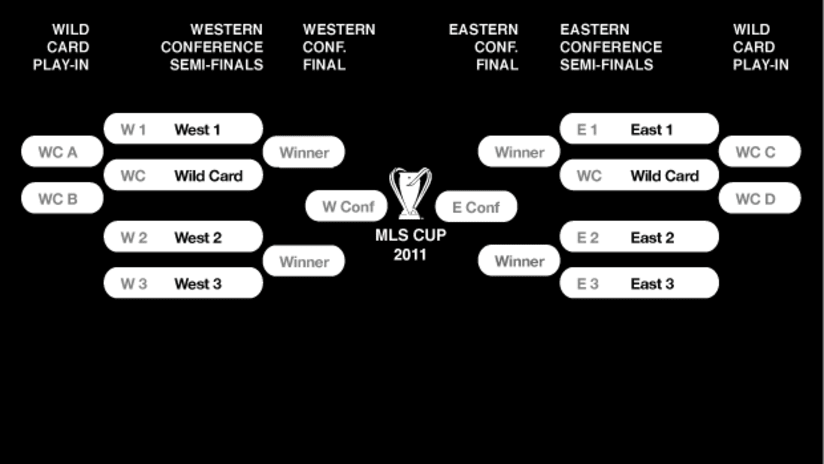Major League Soccer unveiled its long-awaited revamped postseason structure for the 2011 season on Wednesday, giving 10 teams the chance to vie for MLS Cup in a unique twist on the league’s format from the last two seasons.
The league’s new structure will include the top three seeds from each conference and four wild card berths – regardless of conference affiliation – but the postseason will now include two play-in games for those wild card teams.
The expanded system now allows for more teams to be included in the postseason chase, driving more interest throughout the league as two additional teams vie for a spot in the MLS Cup Playoffs.
“While there will be some who say that expanding the playoff field dilutes the regular season, we believe that in a certain way, it actually enhances it,” said Nelson Rodriguez, MLS executive vice president of competition and game operations.
“It will mean that the battle and the race for the playoffs will have added intensity and last longer through the regular season. And that, on balance, should be a good thing for the play on the field, and for the fans in the stands and at home.”
The seventh seed will host the 10th seed while the eighth seed hosts the ninth seed in a one-off playoff game to reach the final eight. The lowest remaining team will then meet the regular-season Supporters’ Shield winner and the second-lowest remaining seed will meet the other conference champion in the Conference Semifinals.
This system ensures that the Supporters’ Shield winner will play the lowest-seeded team available in the Conference Semifinals, a luxury not necessarily awarded to the regular season’s top team in the past.
“It’s the essence of rewarding regular-season performance,” Rodriguez said. “And as we look to the future, we need to continue to construct a playoff format that confers benefit to those teams that do well over a long season."
The Conference Semifinals will consist of a two-game, aggregate-goal series, a structure unchanged from previous postseasons.
The second and third seeds from each conference will play each other in the two-game, aggregate-goal series, with the winners advancing to the one-game conference final at the host site of the higher-seeded team.
The location of the MLS Cup will be determined at a later date.
Conference Championships will still be awarded in 2011, and the new system allows for less conference crossover in the postseason. In fact, the new system will not allow for a situation where two teams from the Western Conference to play in the Eastern Conference championship, as the San Jose Earthquakes and Colorado Rapids did in 2010.
Rodriguez said keeping conference consistency was crucial for the league in the new postseason format.
“We’ve eliminated the possibility of having two out-of-conference teams competing for a conference championship,” Rodriguez said. “And we’ve decreased the likelihood of an out-of-conference team winning an out-of-conference championship.
“In the end, we took the course that rewarding regular-season performance and pitting the No. 1 seed against the worst advancing wild card was more important.”
Rodriguez admitted that there are factors beyond the league’s control that could create criticism with the new structure, including the Supporters’ Shield winner facing a long travel haul while playing a cross-conference game in the opening leg of the conference semifinals .
“There are so many variables that any system is imperfect in that regard,” Rodriguez said. “You could be facing the lowest-remaining seed who’s on a 10-game winning streak to close the season and they’re the hottest team in the league. … Any playoff system has within it, some fault or a flaw that could easily be pointed to.”
He also stated that as the league expands to 19 teams in 2012 and eventually to 20 in the near future, both the balanced schedule and the current playoff structure could be altered in the future to accommodate a more conference-specific playoff qualification.
“At the end of the day, you try to create a playoff system that is fair and relatable to the regular season,” Rodriguez said. “And also one that is a compelling format in and of itself. We think this iteration is an improvement over the last and we will spend the next bit of time trying to finalize a long-term playoff situation that can take us into the future.”




